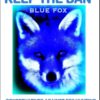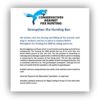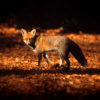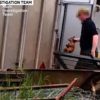Please listen to the 45 minute programme here; http://www.bbc.co.uk/iplayer/episode/b0144rqr/The_Reunion_The_Hunting_Ban/
The panel of speakers include three pro hunting spokespersons and two anti hunt speakers Professor John Cooper QC and John Rolls, the Director Of Policy of the RSPCA .
End of article.
New article. Spoiling The Devon Countryside
Written by Joe Duckworth, CEO of The League Against Cruel Sports on 05 September, 2011 : 15:11
‘Devon is a great place to go on holiday and last week I mentioned that the majority of people are there opposed to hunting with dogs. But there are people in Devon who are driven to hunt by a passion that I just can’t understand.
I bumped into one of the hunts as I was cycling over Exmoor. There was a collection of vehicles all along the side of the road with a small crowd all peering over to the east. They were a strange mixture of old smartly dressed men, some families with young children and some rather dodgy looking big blokes.
Down round a covert was a stag hunt. Quad bikes, men on horses and a red coat were wondering around where a deer was obviously hidden. I stayed around for about 20 minutes. After a while the hunt followers began to be suspicious of this strange cyclist. As a tourist in this great county I started to feel quite insecure as they stared at me with very cold and threatening eyes. I thought it best to cycle off feeling uneasy and a little threatened.
Some observations. When tourists bump into this sort of stuff it is not good for the local economy. The majority of people are against these cruel, nasty sports and don’t want to be confronted by it when they are on holiday. The county council, tourist board and businesses reliant on the tourist trade should take this on board. All the arguments the hunting lobby make about it being good for the local economy are nonsense compared to the effect on tourism of the reputational damage these hunters have on Devon. The majority of tourists will not see playing at hunting as a quaint rural tradition but a nasty blood sport.
Second, involving young kids in this sort of stuff is horrible. I suppose they think they are continuing the line of blood sports enthusiasts by desensitising them from a young age. Are the children given the other side of the story? Of course not. I’ve heard stories of how the governors in some village schools make sure that the majority opinion against blood sports are not heard by their children.
Thirdly, was the hunt committing a crime under the Hunting Act? I’m sure they were being careful as they were right next to a main trunk road. The key is our hunt monitoring activity which either sees they are acting within the law or it provides us with evidence to get prosecutions. We are getting much better at surveillance. Now we are getting much better at using the intelligence we get too. We have just set up a system based on what is called the ‘National Intelligence Model’ (NIM). This is a state of the art way of gathering and analysing information about wildlife crime. It produces robust reports which can be used for a variety of purposes from building prosecution files to influencing policing priorities based on hard facts.
It also allows us to give our independently gathered robust intelligence to the police in a way they can use and understand, as they use NIM data all the time. Last week we had a meeting with Chief Constable Crompton who is the Association of Chief Police Officers’ lead on wildlife crime. With him were senior people from the National Wildlife Crime Unit. We gave them a demonstration of our system and I think they were rather impressed.
Finally, some of the hunt followers I saw were scary heavies. I’m not one for using stereotypes but they looked as though they would dabble in all sorts of nefarious stuff. Our intelligence system can link all sorts of activity together, whether wildlife crime or other activity like intimidation of those opposed to hunting. We will be able to use this intelligence to help the police possibly solve many crimes. For example, it is probable the people involved in badger crime are also involved in other crimes like poisoning raptors. Violent criminals involved in drugs and people trafficking are often involved in dog fighting too.
Whilst on holiday I read a brilliant crime novel. It showed how some damaged individuals are equally and casually cruel to animals and people. I recommend you read The Devil’s Dogs by Penny Morgan. It is set in the world of terriermen and hunters who are also into all sorts of other criminality from organised dog fighting and badger baiting to murder. Whilst set in this territory it spares the reader from the sheer horror of it by not being too descriptive of dog fights and the like, but it focuses more on the damaged humans engaged in the activity. I won’t tell you too much as I don’t want to spoil your read, but it has a twist at the end which you will not expect! I’d urge you to get a copy!’
http://www.league.org.uk/blogs_entry.aspx?id=615 Please read the orginal article on this link.






